#latasha
Photo
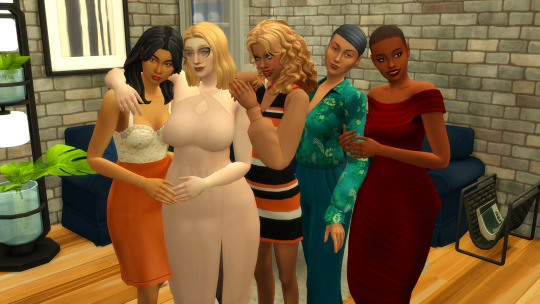
serena and her friends, from left to right ami stokes, melody ikeda, etsuko wada, and latasha ishida celebrating her engagement!
4 notes
·
View notes
Text
New Gaming video up on my YouTube channel go check it out!
youtube
#gaming#gameplay#walkthrough#youtube#video#gamer#twopointcampus#twopointstudios#latasha#letsplay#latashasummers#gamingwithlatashatsummers#twopointcampusgameplay#twopointcampuswalkthrough#twopointcampusplaythrough
0 notes
Text
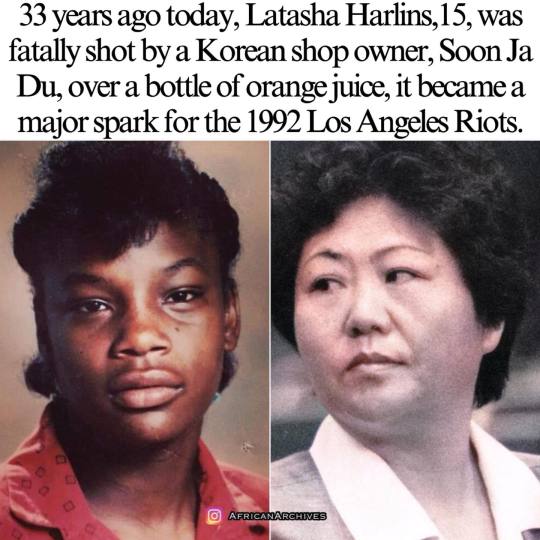
On March 16, 1991 Latasha Harlin’s short life came to a violent end in the midst of racial tensions in LA, and became a major spark for the 1992 Los Angeles Riots.
By the late 1980s, racial tensions were high in South Los Angeles.
After the change in national immigration laws in 1965 a large number of Korean immigrants arrived in Los Angeles and by 1968 the first Korean-owned market opened in South Central LA.
Longtime African American residents in the area at first welcomed the Koreans but eventually grew angry with them because they refused to hire black employees and often treated their customers poorly.
By 1990, 65% of South Central businesses were Korean-owned and a 1992 survey of these storeowners revealed considerable racial prejudice against black customers and black people in general.
Koreans in response argued that their attitudes evolved from high crime rates in the area and shop owner fears of shootings and burglaries. Latasha Harlins became a victim of these racial tensions on the morning of Saturday, March 16, 1991.
She entered a store owned by a Korean family, to purchase a bottle of orange juice. As she approached the counter, Soon Ja Du, accused her of stealing after seeing her place the bottle in her backpack, despite her holding the $2 payment approaching the counter to pay.
Du grabbed the bag and the two women had a violent scuffle. Harlins threw the juice bottle back on the counter and turned to leave the store when Du pulled a .38-caliber handgun and shot 15-year-old Harlins in the back of the head.
Du was arrested and her trial was held on November 15, 1991. Security-camera footage which showed Harlins’ attempt to pay for the juice and the subsequent scuffle between the two women convinced a jury to find Du guilty of voluntary manslaughter.
The Judge, Joyce Karlin, rejected the jury’s recommendation and instead sentenced Du to five years probation, 400 hours of community service, and a $500 fine.
One of the many reasons black people don't f*** with Asians like that and we should collectively drive them out of our neighborhoods
#latasha harlins#los angeles riots#racial tensions#korean immigrants#south los angeles#soon ja du#racial prejudice#voluntary manslaughter#racial discrimination#asian anti blackness#asian racism
172 notes
·
View notes
Text
OG_Grind_V
#OG_Grind_V#LaTasha Vance#assmazin#hips & ass#thick#wifey type#i say damn!!#thick thighs#cheeks#omg!!!#melanin goddess
165 notes
·
View notes
Text
So the Latasha Harlins movie trailer went viral:
https://x.com/slausongirlnews/status/1690120102417764356?s=46&t=VgNCf575PY7lLqxkH7ldJw
This is Latasha in real life:

This is Latasha in the movie:

And just for comparison:
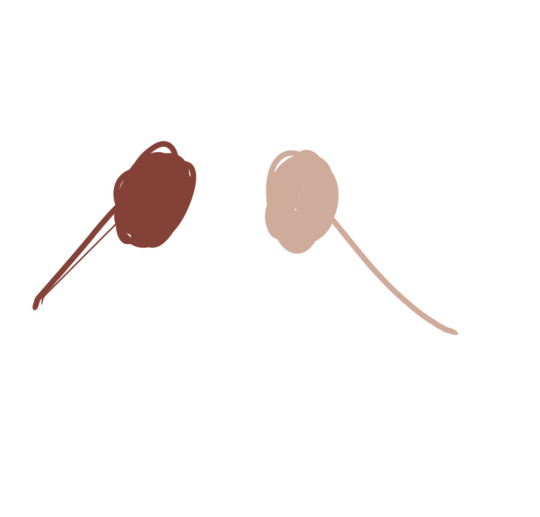
@thisismisogynoir
87 notes
·
View notes
Text
i can’t find my original posts i made about colorism on here, but seeing a filmmaker make a movie about latasha harlins and casting a light skinned girl as latasha when her being dark skinned played a key role as to how the media/court perceived, demonized, and painted her makes my blood boil. thats why i always shout from the rooftops that it is deeper than dating when it comes to the topic of colorism.
#it’s as if they casted her as light skinned to have the audience sympathize with latasha’s story more#so that brings the question are darker skinned people not enough to gain sympathy by people?#is our skin complexion that much of a worry to you that you can’t sympathize when a teenage girl got shot in the head due to a store owner#assuming she was going to steal?
40 notes
·
View notes
Text
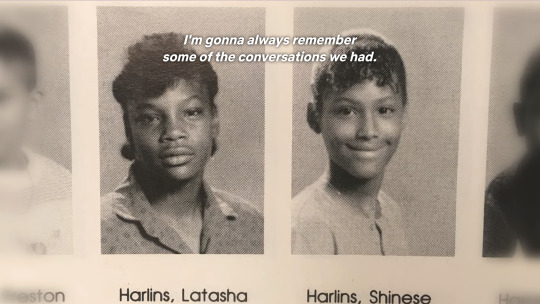

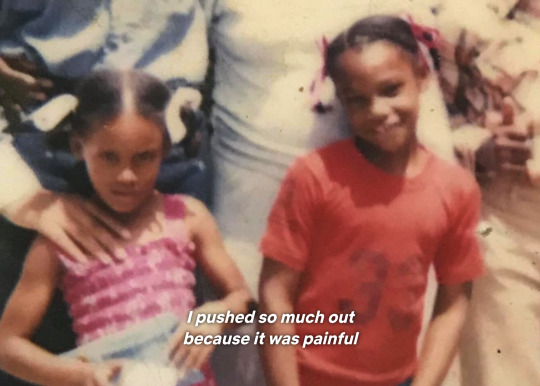


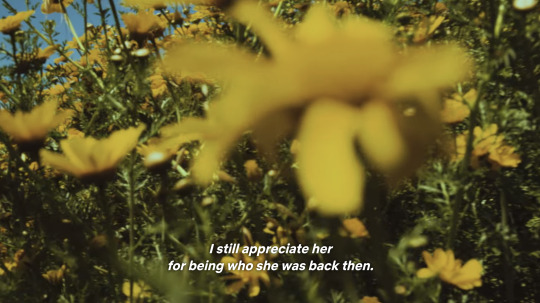
A Love Song for Latasha (2020)
8 notes
·
View notes
Text


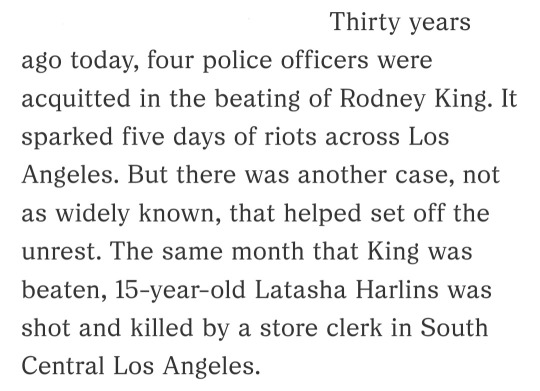
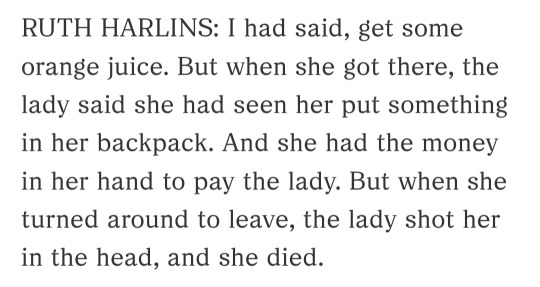
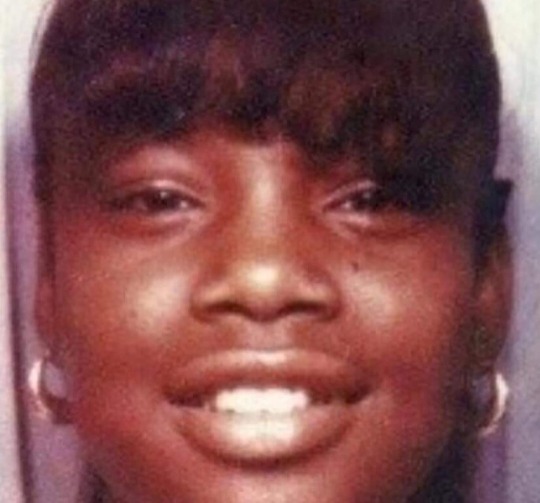
#true crime#latasha harlin#los angeles#california#homicide#solved#ja du#1991#90s#rodney king#history
6 notes
·
View notes
Text

Most people recognize that there are first names given almost exclusively by black Americans to their children, such as Jamal and Latasha.
While fodder for comedians and social commentary, many have assumed that these distinctively black names are a modern phenomenon. My research shows that’s not true.
Long before there was Jamal and Latasha, there was Booker and Perlie. The names have changed, but mycolleagues and I traced the use of distinctive black names to the earliest history of the United States.
As scholars of history, demographics and economics, we found that there is nothing new about black names.
youtube
Black Names Aren’t New
Many scholars believe that distinctively black names emerged from the civil rights movement, perhaps attributable to the Black Power movement and the later black cultural movement of the 1990s as a way to affirm and embrace black culture. Before this time, the argument goes, blacks and whites had similar naming patterns.
Historical evidence does not support this belief.
Until a few years ago, the story of black names depended almost exclusively on data from the 1960s onward. New data, such as the digitization of census and newly available birth and death records from historical periods, allows us to analyze the history of black names in more detail.
We used federal census records and death certificates from the late 1800s in Illinois, Alabama and North Carolina to see if there were names that were held almost exclusively by blacks and not whites in the past. We found that there were indeed.
For example, in the 1920 census, 99 percent of all men with the first name of Booker were black, as were 80 perecent of all men named Perlie or its variations. We found that the fraction of blacks holding a distinctively black name in the early 1900s is comparable to the fraction holding a distinctively black name at the end of the 20th century, around 3 percent.
What Were the Black Names Back Then?
We were interested to learn that the black names of the late 1800s and early 1900s are not the same black names that we recognize today.
The historical names that stand out are largely biblical such as Elijah, Isaac, Isaiah, Moses and Abraham, and names that seem to designate empowerment such as Prince, King and Freeman.
These names are quite different from black names today such as Tyrone, Darnell and Kareem, which grew in popularity during the civil rights movement.
Once we knew black names were used long before the civil rights era, we wondered how black names emerged and what they represented. To find out, we turned to the antebellum era – the time before the Civil War – to see if the historical black names existed before the emancipation of slaves.
Since the census didn’t record the names of enslaved Africans, this led to a search of records of names from slave markets and ship manifests.
Using these new data sources, we found that names like Alonzo, Israel, Presley and Titus were popular both before and after emancipation among blacks. We also learned found that roughly 3 percent of black Americans had black names in the antebellum period – about the same percentage as did in the period after the Civil War.
But what was most striking is the trend over time during enslavement. We found that the share of black Americans with black names increased over the antebellum era while the share of white Americans with these same names declined, from more than 3 percent at the time of the American Revolution to less than 1 percent by 1860.
By the eve of the Civil War, the racial naming pattern we found for the late 1800s was an entrenched feature in the U.S.

Company E was the fourth U.S. Colored Infantry during the Civil War. Credit: Everett Historical / Shutterstock.com.
Why Is This Important?
Black names tell us something about the development of black culture, and the steps whites were taking to distance themselves from it.
Scholars of African American cultural history, such as Lawrence W. Levine, Herbert Gutman and Ralph Ellison, have long held that the development of African American culture involves both family and social ties among people from various ethnic groups in the African diaspora.
In other words, people from various parts of Africa came together to form black culture as we recognize it today. One way of passing that culture on is through given names, since surnames were stolen during enslavement.
How this culture developed and persisted in a chattel slavery system is a unique historical development. As enslavement continued through the 1800s, African American culture included naming practices that were national in scope by the time of emancipation, and intimately related to the slave trade.
Since none of these black names are of African origin, they are a distinct African American cultural practice which began during enslavement in the U.S.
As the country continues to grapple with the wide-ranging effects of enslavement in the nation’s history, we cannot – and should not – forget that enslavement played a critical role in the development of black culture as we understand it today.
Trevon Logan is the Hazel C. Youngberg Distinguished Professor of Economics at The Ohio State University
#Black Culture Matters#Black Names#A Brief History of Black Names#From Perlie to Latasha#Black Lives Matter#Youtube
5 notes
·
View notes
Photo

LaTasha N. Nevada Diggs, Ama Agehya/Water Woman (excerpt), [first appeared in «Flyway» – Journal of Writing & Environment, Volume 14:3-15:I, Spring, 2012], Design and printing by Roni Gross, Center for Book Arts (CBA), New York, NY, 2013, Produced in an edition of 100 copies in honor of the poet’s reading at Center for Book Arts, on April 26, 2013 [The Cherokee (tsalagi) characters were set in Plantagenet from the tsalagi syllabary] [© LaTasha N. Nevada Diggs, Roni Gross]
#graphic design#typography#art#poetry#reading#broadside#journal#latasha n. nevada diggs#roni gross#flyway#center for book arts#2010s
16 notes
·
View notes
Text
I didn’t think this needed to be said but trying to say that the LA Uprisings that occurred April 29th, 1992, which were the result of the killings of Latasha Harlins and Rodney King, are ahistorical cuz shops in KTown were destroyed is also ahistorical and antiblack. The only reason shops in KTown were looted and destroyed is cuz LAPD blocked protesters in KTown in order to keep them away from white towns. Stop spreading false information.
140 notes
·
View notes
Text
you ever come across content about historical events that are inherently marked by racial strife and the post itself is fine but you know that the comments will be a cesspool so you just scroll on past?
#that just happened to me w/ a post about latasha harlins on one of those content farm-y accounts#post was fine but i know better…
6 notes
·
View notes
Note
Pick three OCs. How would they explain the origins of the Sith if asked?
This is an interesting ask. Took me a while to think about this one (which is weird, considering that the origins of the sith is one of my special knowledge topics xD)
The OCs I picked are Darth Latasha (non swtor), Celeina (swtor) and Yklier (swtor)
Latasha was actually one of the first Sith so she'd give you a very detailed history that would end in a rant about why Sorzus Syn sucked and deserves to rot forgotten in a grave
Celeina wouldn't even try explaining. She doesn't care about force users at all so she'd just refer you to some force user she knows that probably isn't even qualified for explaining the origins
Yklier would look at you like you just asked him if one could still drink spoiled milk and then just go back to his work. But he hates leaving questions unanswered so he'd look it up one the holonet an hour later and send you the link to a website that was probably written by someone who didn't have sources
5 notes
·
View notes
Text
That girl who made a thread talking about the la riots without even mentioning how and why they started (how convenient) is getting cooked in the qrts.
#that’s why I hate it when whites and poc#especially poc#lump black ppl into the ‘poc’ category#most of them are just as antiblack as white folks like extremely so#the girl kept on going on about their small businesses and This and that#while completely leaving out latasha harlins’ name and the lady who murdered her#I think static plays over and over in the brains of these people I swear#rambling#the qrts… lol#very gross and antiblack thread#it’s embarrassing that the thread is still up and she’s only replying back to like other Asians but ignoring all of the black ppl calling#her out#clown#and the few Asians who are calling her out on her rhetoric#she’s trying to combat them and make it seem like they don’t know what they’re talking about#twitter is definitely a cesspool#a least on tumblr ppl just deactivate after embarrassing themselves#on twitter ppl will be loud and wrong and racist and proud of it#I’m sure that if they could they’d put a prized ribbon on their own tweets#I wasn’t even going to look at the thread but I was curious and it’s just as awful as I’d initially figured it would be#it’s like#Omg corny lame boooooooooooo tomato tomato tomato I’m throwing tomatoes !!!!!#she’s going to hell. I hope#funny that the threads attracted the alt right crowd#‘but I’m a leftist-‘ who is also racist af and made the most tone deaf and antiblack thread of the week
4 notes
·
View notes
